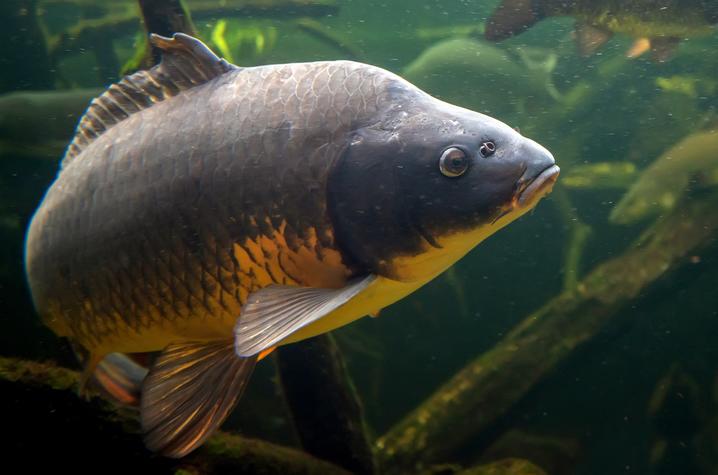UK transforming invasive carp into health-boosting collagen products

LEXINGTON, Ky. (Nov. 14, 2024) — The University of Kentucky Martin-Gatton College of Agriculture, Food and Environment (CAFE) is leading a new project that could redefine how invasive carp are managed in U.S. waterways. A UK researcher believes the issue could be neutralized by turning this ecological threat into a valuable health and economic resource.
Funded by a $300,000 grant from the National Institute of Food and Agriculture, UK Department of Animal and Food Sciences Assistant Professor Hongbing Fan and his team are exploring methods to extract collagen from the skin of carp, creating proteins and peptides for health products that could support skin and bone health. Titled “Utilizing Collagen of the Invasive Asian Carp, an Underutilized Protein Source,” this initiative could provide new economic opportunities for local fishing communities while helping to restore ecological balance to key U.S. river systems.
Asian carp were initially introduced in the U.S. in the 1970s to manage water quality but have since spread rapidly throughout the Mississippi River Basin, where they have posed a significant threat to local fish and ecosystems. The carp are most prevalent in the Mississippi River.
“These carp were originally brought in for water management, but without natural predators here, they’ve become a widespread issue,” Fan said. “Today, they are a serious concern, especially in the Mississippi River Basin and other interconnected waterways, where they compete aggressively with native species.”
The project aims to make carp a useful and profitable resource through collagen extraction. Collagen is a protein naturally found in skin, bones and connective tissues and is known for its benefits in supporting skin elasticity, joint health and bone strength. Fan’s team is focused on extracting collagen from the carp’s skin to create collagen peptides — small protein segments easily absorbed by the body and used in supplements, food additives and skincare products.
“This is about transforming a challenge into a solution,” Fan said. “In Asian countries, carp is highly valued as a food source. Here, we see an opportunity to use the fish for health products that can benefit consumers and help reduce the population in our waterways.”
The team partners with Kentucky-based fisheries to source silver carp abundant in local rivers. After being processed, the carp's skin will undergo a detailed extraction process to ensure purity and quality. First, it’s treated to remove noncollagen proteins, then dissolved in a mild acid to extract the collagen, which is later freeze-dried. Finally, the collagen is broken down into peptides through enzymatic hydrolysis — a process where enzymes use water to break down complex molecules — making it easily digestible.
“This approach ensures that we create high-quality collagen peptides,” Fan said. “These peptides are not only easy for the body to absorb, but they are also effective for supporting skin and joint health, which makes them valuable to be incorporated into a wide range of products.”
Fan’s vision is to create a market that values carp for its health-boosting properties, which could incentivize its removal from U.S. waterways.
“If we demonstrate the health benefits of carp collagen, it could create a demand for the fish, encouraging local fishing industries to harvest more of them that can generate extra revenue for the fishermen,” Fan said. “This way, we’re not only addressing an environmental problem but also supporting local economies by turning carp into a viable product.”
The research team is exploring potential uses of collagen peptides in food and beverage products as a protein source. Low-molecular-weight collagen peptides, such as those developed from carp, are increasingly popular in products like protein bars, beverages and dietary supplements. This project could position carp collagen as an affordable and sustainable protein alternative.
“This research is about long-term change,” Fan said. “There are very few fisheries for carp processing in the U.S. If successful, it could lead to an entirely new industry around carp processing where we can see both environmental and economic impacts. We’re showing that an invasive species can be a valuable asset.”
This material is based upon work that is supported by the National Institute of Food and Agriculture, U.S. Department of Agriculture, under award number 2024-67018-42815. Any opinions, findings, conclusions or recommendations expressed in this publication are those of the author(s) and do not necessarily reflect the view of the Department of Agriculture.
As the state’s flagship, land-grant institution, the University of Kentucky exists to advance the Commonwealth. We do that by preparing the next generation of leaders — placing students at the heart of everything we do — and transforming the lives of Kentuckians through education, research and creative work, service and health care. We pride ourselves on being a catalyst for breakthroughs and a force for healing, a place where ingenuity unfolds. It's all made possible by our people — visionaries, disruptors and pioneers — who make up 200 academic programs, a $476.5 million research and development enterprise and a world-class medical center, all on one campus.




